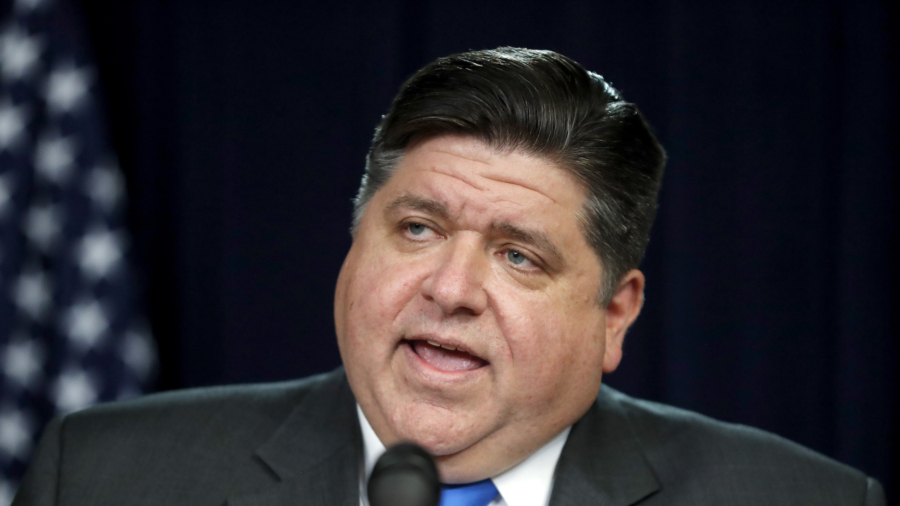Illegal immigrants residing in Illinois could soon be entrusted to enforce the state’s laws after Democratic Illinois Gov. J.B. Pritzker signed a bill into law allowing noncitizens to become police officers.
On Friday, Mr. Pritzker signed HB 3751 into law. The bill, which goes into effect immediately, allows illegal immigrants who are residing in the country through the Deferred Action for Childhood Arrivals (DACA) program to apply to become police officers and sheriff’s deputies.
DACA is a program through which the federal government defers deportation actions against noncitizens who entered the United States illegally when they were children. The Illinois law states that “an individual against whom immigration action has been deferred by the U.S. Citizenship and Immigration Services under the federal Deferred Action for Childhood Arrivals (DACA) process is allowed to apply for the position of police officer, deputy sheriff, or special policeman, subject to specified requirements.”
HB 3751 garnered bipartisan support in the Democrat-controlled Illinois legislature. The bill passed in the state House in March by a vote of 101–0, garnering the support of 35 Republicans. The bill faced greater opposition in the state Senate before it passed in May by a vote of 37–20. The Senate vote saw one Republican join the majority of Democrats who supported the bill while two Democrats joined the majority of Republicans who opposed it.
Mr. Pritzker signed HB 3751 into law on Friday along with more than 100 other bills.
Democratic state Rep. Barbara Hernandez, the bill’s sponsor, said she’s hopeful that the law will be mutually beneficial for DACA recipients looking to find employment and serve their community, as well as police departments dealing with hiring shortages.
“My hope is to not only help DACA recipients but also help the police departments that are currently going through a lot of shortage with … either COVID or retirement,” she said in a May press statement.
The bill’s passage caught the attention and criticism of Republicans in the U.S. House of Representatives. On Saturday, Rep. Mary Miller (R-Ill.), a member of the Illinois U.S. congressional delegation, posted on Twitter: “At 5pm yesterday, when no one was paying attention, Pritzker signed a bill to allow illegal immigrants to become police officers, giving non-citizens the power to arrest citizens in our state. No sane state would allow foreign nationals to arrest their citizens, this is madness!”
Rep. Lauren Boebert (R-Colo.) also posted: “In the state of Illinois, illegals can now become police officers. Yes, you heard that right. People who are breaking the law by their presence here can now arrest American citizens. You know the other blue states are watching and getting ready to implement this idea as soon as they can! We either address this border crisis or allow our country to descend further into a Leftist dystopia.”
Illinois Law Faces Obstacles
The Illinois state law could face an uncertain future due to legal challenges that have been raised against DACA, as well as the federal program’s own restrictions.
DACA was created through executive action after successive failures to pass legislation called the Development, Relief, and Education for Alien Minors (DREAM) Act. The DREAM Act would have provided deferred action, amnesty, and an eventual path to citizenship for illegal immigrants who arrived in the United States as children. On June 15, 2012, then-President Barack Obama cited Republican opposition to attempts to pass the DREAM Act and announced his administration would instead exercise their own discretion not to deport people who entered the United States illegally as children, establishing (pdf) the DACA process.
The DACA program has faced successive legal challenges, with opponents arguing that its implementation violated executive rulemaking procedures and conflicted with existing U.S. immigration laws, such as the Immigration and Nationality Act. In October, the U.S. 5th Circuit Court of Appeals court upheld a lower court’s determination that DACA is unlawful, but has allowed the program to continue while the federal courts evaluate new rules submitted by President Joe Biden’s administration.
Even without the uncertainty of DACA’s future, the program does not actually allow its participants to own firearms—a potentially significant challenge for those entering the law enforcement profession.
In comments to The Daily Northwestern in May, Ms. Hernandez admitted some federal action may be necessary to make it feasible to hire DACA participants as law enforcement officers. She’s hoping federal action will create a narrow carveout for law enforcement purposes.
“Unfortunately, we will need to see some federal government action,” Ms. Hernandez told the publication. “I’m not saying everybody. Just allow those that are applying to be an officer, if they are hired, to be able to have a gun on duty and off duty.”
Last September, Democratic California Gov. Gavin Newsom signed a similar bill that drops the requirements for law enforcement officers to be citizens or lawful permanent residents in the United States, instead allowing those with work authorization such as DACA participants to become police officers.

